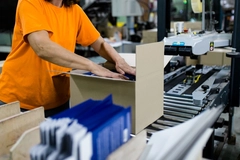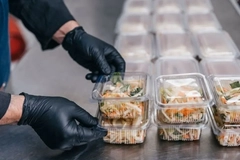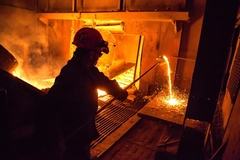Robotic arm milks dairy cows
04 Dec 2012

A robotic dairy milker that saves labour costs will have a huge impact on the dairy sector, say its backers who aim to commercialise the system within 12 months.
A robotic dairy milker that saves labour costs will have a huge impact on the dairy sector, say its backers who aim to commercialise the system within 12 months.
NZX-listed firm Scott Technology has joined farmers to form a joint venture, Scott Milktech. It gave an on-farm milking demonstration with a robotic prototype on a Canterbury farm.
The farmers have kept the innovative robot system "under the radar" while spending "many millions" to ready it for sales into New Zealand and export dairy markets.
The "six-axis robot" uses an arm to lift milking cups on a rotary dairy milking system onto the teats of cows that are usually milked twice daily.
The demonstration at the Rangitata Dairies farm near Rangitata, showed the system which uses a camera and software to co-ordinate then locate the cups on the udder and start the milking process. It was designed to operate without human intervention, though staff did need to be onhand.
Discussing how significant the robotic development would be, Scott Milktech chairman Murray King said: "Huge, absolutely significant. For a long time we have been faced with struggling to attract and retain quality labour.
"This is the most mundane job on a dairy farm and a lot of guys will be spending many hours a day."
Scott Technology chief executive Chris Hopkins said the robotic systems would retail for "several hundred thousand" with the robotic arms paying for themselves in three to five years. The robots would be "progressively rolled out" to interested farmers so the system was further refined over time.
Patents had been gained or were being sought, including in the markets of South Africa, Europe, Australia and the United States, though early sales were likely to be in New Zealand.
The farmers first started on the idea seven years ago, but found the idea was "not that easy", King said.
Scott Technology now held 61 per cent of the venture; with King, Fonterra chairman-elect John Wilson (who has a stake in Rangitata Dairies) and John Fegan, who works in recruitment for the agricultural sector, holding the other 39 per cent.
While other automated systems had been created internationally, the Milktech venture had focused on making the robotic arm suitable for existing rotary milking systems.
The joint venture had achieved a 95 per cent success rate in the placement of the four cups within a 15-second to 20-second time frame on a cow, King said. "That is what is crucial to fit into a commercial dairy, to get the throughput of cows per hour."
Hopkins said the joint venture was in talks "trying to find a strategic partner" to help commercialise the product.
King said cows being creatures of habit soon got used to the system, and were more productive in a calm environment. "The robot doesn't have a bad day, it's repeatable, it's reliable, it doesn't sleep in."
Source: Scott Technology Ltd
All content and features on this website are copyrighted with all rights reserved. The full details can be found in our privacy statement
Subscribe to our newsletters
By continuing to browse our site you agree to our Privacy Statement











